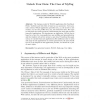Free Online Productivity Tools
i2Speak
i2Symbol
i2OCR
iTex2Img
iWeb2Print
iWeb2Shot
i2Type
iPdf2Split
iPdf2Merge
i2Bopomofo
i2Arabic
i2Style
i2Image
i2PDF
iLatex2Rtf
Sci2ools
100
click to vote
FIS
2008
2008
Unlock Your Data: The Case of MyTag
The business model of Web2.0 applications like FaceBook, Flickr, YouTube and their likes is based on an asymmetry: Users generate content, Web2.0 application providers own, (i), the access to user content, (ii), the user profiles and, (iii), user interaction data. We argue in this paper that such asymmetry disadvantages the users and prevents innovative applications. We demonstrate an application, MyTag, that is based on a layer for cross-application user profiling and personalization and that exploits web service access to user data. Presenting this application, we conclude that such applications offer additional value to users and usage of such applications on content generated by the users should not be at the disposal of the application provider, but should be a part of users' rights.
| Added | 26 Oct 2010 |
| Updated | 26 Oct 2010 |
| Type | Conference |
| Year | 2008 |
| Where | FIS |
| Authors | Thomas Franz, Klaas Dellschaft, Steffen Staab |
Comments (0)

